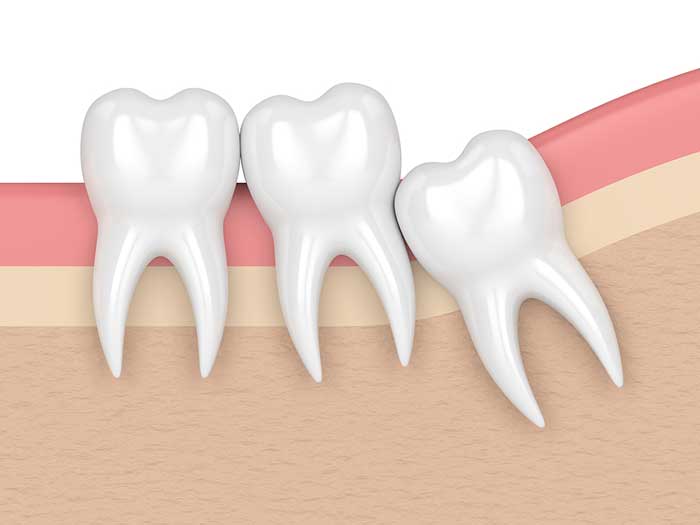What Is a Soft Tissue Impacted Wisdom Tooth?

Keeping your wisdom teeth poses a number of risks to your oral health. Wisdom teeth rarely erupt properly through the bone and gums. Instead, wisdom teeth tend to become impacted. There are two types of impaction: soft tissue and bony.
Soft tissue wisdom tooth impaction means that a wisdom tooth (third molar) has come through some of the bone but stays partially submerged in the gingiva. A bony impaction, on the other hand, means that the wisdom tooth is stuck in the jawbone.
Wisdom teeth removal helps prevent and mitigate issues associated with third molar retention.
Why Is Soft Tissue Impaction a Problem for Oral Health?
Any kind of impaction is a problem for oral health but soft tissue impaction contributes to specific oral health concerns. When a tooth is partially submerged under the gingiva, debris and bacteria can become trapped on a tooth’s surfaces under the gums. Since the tooth is partially under the gums, its surfaces cannot be cleaned. This scenario leads to a heightened risk for dental caries, abscesses, and periodontal disease.
What Other Problems Are Caused by Wisdom Teeth Retention?
Retaining your wisdom teeth can cause more than just increased risks for infections and decay. Emerging wisdom teeth can cause your teeth to shift out of place, which contributes to orthodontic and occlusal issues. Teeth might become overlapped, crowded, and crooked once wisdom teeth emerge. In fact, some patients need orthodontic treatment to correct issues caused by the arrival of wisdom teeth.
Wisdom teeth might cause facial discomfort such as sensations of pain and tenderness on the lower half of the face and near the ears. Wisdom tooth retention contributes to TMJ disorder and headaches, too.
Will I Be Comfortable During Wisdom Teeth Extractions?
Our oral surgeon takes great care to ensure that our patients are comfortable during and after their procedures. We utilize pain-relieving and sedating medications during oral surgery so that our guests are physically and emotionally comfortable. Patients will receive take-home packets of information with tips on how to maintain comfort after their procedures as well.
Call Stonebriar Facial & Oral Surgery to ask questions or schedule a consultation.
